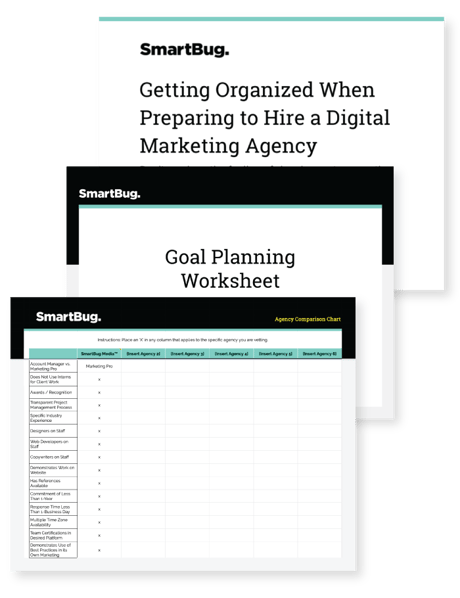
The Ultimate Guide to Hiring a Marketing Agency
Hiring a digital marketing agency to amplify or outsource your demand generation can be a daunting task. After all, you are entering a partnership to improve the ROI of your marketing efforts. Finding the right fit for your specific needs means you have to do some legwork in the beginning, but the payoff has such great potential! Keep reading to learn how to set goals and expectations, vet multiple agencies, and more.
Get the Ultimate Guide to Hiring a Marketing Agency Packet
Continue scrolling, or simply fill out this form to save all of the available resources from this page, such as the Getting Organized Worksheet, Goal Planning Worksheet, and the Agency Comparison Chart

Chapters
Preparing to Talk to a Digital Marketing Agency
Goal Setting
Finding the Right Fit
Understanding Pricing Models
Preparing to Talk to a Digital Marketing Agency

Hiring an agency partner is an important decision, and it’s not one to take lightly. Just like any hiring decision, you’ll want to do some planning and prep work before you get started. We regularly see folks who work to hire an agency and then, halfway through the process, they realize they don’t have enough insight into their own organization to start the partnership. Here are four tasks you’ll want to complete before hiring an agency:
Take a Full Account of Your Current Status
As with any partnership, transparency is key. You hire an agency because you don't have the internal capacity and/or knowledge to complete all of the marketing activities necessary to meet and exceed your goals.
Let’s start with what your team is good at. You should be able to clearly communicate the strengths of your internal team to the agencies you are vetting. When you are looking for a strategic agency partner, understanding how to leverage the strengths of your internal team effectively is a big deal.
For example, in the
On the flip side, you’ll also want to make sure you have a strong understanding of your shortcomings and strengths before talking to an agency.
Most importantly, you should be transparent and detailed when talking with potential agency partners about this information. In the past, we’ve seen potential clients cover up or minimize their weaknesses. Great marketing agencies won’t judge you for what you’ve been able to do at your current capacity. The fact is this: Agencies are here to help you—that’s our whole job. If you can’t communicate your opportunities for improvement, it can be harder to start off on the right foot with an agency.
Ultimately, your agency partner can’t create a custom plan to match your needs if you haven’t first sat down to take a full account of your current state and shared that information.
When you are looking for a strategic agency partner, understanding how to leverage the strengths of your internal team effectively is a big deal.
Evaluate Foundational Marketing Elements
As part of auditing of your current state, you’ll want to take a hard look at foundational elements of your marketing:
- Does your brand reflect where your company is today?
- Is your website out of date?
- Do you have the marketing
technology you need to support your desired marketing efforts? - If you don’t have the right marketing technology, will you need to migrate any resources from an old platform to a new platform?
These are just some of the questions you’ll want to ask before talking to a marketing agency. If you don’t evaluate foundational marketing elements, you risk having an agency drive traffic to an out-of-date website with branding that doesn’t reflect what you do or who you are.
Understand Your Business, Services, and Goals
It might be surprising to hear, but we often talk with potential clients who are not certain about the basic elements of their business. One minute we are talking with a marketing manager who thinks their ideal buyer is a CTO or CIO at a Fortune 500 company, the next minute we’re talking to the marketing director who thinks the ideal buyer is a systems administrator at a mid-sized business.
Likewise, it’s unsurprising to have prospective clients who haven’t taken an inventory of today’s business performance. At a high level, it’s helpful if you can talk about the following:
- Your current traffic volume and what channels drive the most traffic
- Where most of your leads come from
- Number of new customers secured in a month
- Which channels provide the most customers
- The average value of a customer
- Approximate annual revenue
With this in mind, it’s helpful to have a clear understanding of how you would like these numbers to improve over the next six months to a year.
If you’re able to articulate business performance today and where you want it to be in the future, along with details about your products, your business, and your buyer, then an agency should be able to create a custom plan that fits your needs. Without knowing where you are today and where you want to be in six months to a year, it becomes difficult to build a custom plan that’s right for your business goals.
Collect Internal Direction & Buy-In
In the perfect scenario, you’ll meet with an agency after having already discussed your marketing needs with your leadership team. This might look different for everyone depending on the size of the organization. In some cases, it might mean involving your CEO, COO, VP of Marketing, or other senior-level members. If you’re the CEO of a smaller business, it might mean talking to your team about what
You should talk to key stakeholders early to save yourself time later. If you don’t, here’s what might happen:
You meet a few marketing agencies and have one or two meetings with each, and then a proposal review with a select few. You decide that you like one of the proposals the most and bring that to your leadership. At this point, it may not sound like you’ve spent a lot of time, but you’ve likely invested 10+ hours in introductory meetings, proposal presentations, reviewing proposals on your own, writing emails to agencies, researching agencies, and discussing selection with other marketing team members. Not to mention, you might have brought other people on calls with potential agencies, so you’ve used their time too.
After all that work, you have a full proposal to take to your CEO for final approval, and what happens? They decide that the marketing agency should be focusing most of its time on creating sales enablement content and managing paid search, neither of which is accounted for in the proposal. Now you have to go back several steps in the process to try and realign your efforts. Plus, your CEO is upset that you brought them an inadequate marketing plan.
The point is this: If you get buy-in and direction from leadership early, you can save yourself time and headaches later. Plus, any time that you tack on to your search process is
Red Flag: There’s a reason we’re recommending you do this initial legwork—any agency who’s worth partnering with will ask you about these items. They’ll ask because it helps them build a proposal that best fits your needs. If you talk to agencies who don’t press for this information, it’s likely that they are either a) guessing at your needs or b) giving you the same out-of-the-box solution they give everyone. A good agency doesn’t just talk about tactics, they work to understand your world and your business so they can give you the best possible plan for support.
Resources
Goal Setting

When starting any partnership with a marketing agency, the most important step, without a doubt, is goal setting. Without clearly defining your marketing, sales, and business goals, it’s impossible to know if what you are doing is actually helping you achieve success. Think of goal setting as the coach laying out the plan for the next play—without that vision, there would be players attempting to win the game without knowing who is running what.
For you to be confident an agency can help you reach your business goals, it’s a good idea to have some initial conversations that
Setting Smart Goals
The best place to start your goal planning is
- The goal itself
- Your plans for achieving it
- What challenges and obstacles you may face along the way
- Timelines or milestones to ensure you are on schedule
- The consequences the company faces if the goal isn’t achieved
Setting Creative Goals
Goal setting is also important from a creative perspective. It’s great to have a set of clearly defined and actionable strategies, but without understanding the goal of your organization’s brand, voice, and tone, the execution can flop. Use your creative goals to drive writing as well as design.
To start, complete an assessment of your current identity. This can be formalized through brand research, surveys, and focus groups, but if you don’t have the time or resources to go that route, a simplified version can still be effective. Gather comments and feedback on your brand from clients, as well as internal and external stakeholders. Look at your competitors or leaders in the industry. Collect examples of brands you aspire to be like, as well as ones you clearly do not; it is helpful to eliminate paths as you determine the right one. Identify current pieces of communication from your organization that are on point.
Analyze your brand guidelines (if you have them). Do they:
- Accurately demonstrate the current values and culture of your organization?
- Go beyond the use of your logo to clearly define your brand and bring consistency across your communications?
- Offer insight into your brand's voice and tone?
This form of introspection will help you and your marketing agency assess where your brand is and determine the steps to get you where you need to be. Here’s the hard truth of all of this: Some organizations don’t know their marketing and sales goals nor do they have a clearly defined brand, and that’s okay! A truly professional and experienced marketing agency will have the tools and conversations to help get you there.
Red Flags: There are a handful of red flags you should be aware of when it comes to partnering with a marketing agency that can come to light during this phase of the process:
- If a marketing agency tells you goals are not important in order to put together a successful marketing campaign, run for the hills.
- If a marketing agency undermines your organization’s goals and tells YOU what they should be instead of guiding you to the right plan, grab your coat and leave.
- If a marketing agency skips the goal-setting step altogether, this could be a warning that they don’t execute on strategy but rather on tactics alone. Tell them, “Bye-bye.”
- If a marketing agency says they can start producing content on day one, say, “Thank you, next.” The goals and strategy should always come before tactical implementation.
Finding the Right Fit

In the traditional agency model, you have an internal employee act as the point of contact and they interface with an account manager at the agency. However, times have changed, and business has evolved.
Although account managers still play a valuable role in the business world, what you should really be seeking is a marketing partner with true marketing experts on staff. After all, you’ve likely kicked around the idea of hiring a marketing resource internally, so wouldn’t it make sense to work with an agency where your point of contact is a true strategic expert who is partnering in the success of your business and not just moving projects from A to B? There are three main phases we recommend you go through when finding a marketing agency that truly fits your business:
Research
Your first instinct may be to hop online and start googling for [insert your industry here] agencies. That can be a great start.
For a more personal approach: Leverage. Your. Network.
You likely have a LinkedIn account with hundreds, if not thousands of connections. Consider posting a short description of your business and what needs you are looking to fill with an agency partner. Utilize relevant hashtags in your
You can also research potential partners using online directories or your marketing technology partner. A word to the wise: Look for reviews. For example, if you’re searching for a HubSpot agency, you can look at great resources such as the HubSpot agency marketplace.
As you
Vetting
Once you have identified a list of five to 10 potential agency partners that you are interested in working with, add them to the handy Agency Comparison Chart to start analyzing things such as:
- Does the agency use interns for client work?
- Is their content development or creative work outsourced?
- Are there any awards or industry recognition that are highlighted on the website?
- Does the agency use account managers or marketing strategists as the primary point of contact?
- Do they demonstrate knowledge of your industry or
martech needs?
This chart is an excellent visual that allows you to see a clear breakdown. Once completed, use this to narrow down your search to your top three potential partners. You’re now off to start exploratory conversations!
Tip: When you submit an email on the agency’s contact form, notice whether or not the experience is optimized and efficient. After all, they’re a marketing agency, so they should be practicing what they’re preaching.
Red Flags: With your top three agencies now selected, you should focus on disqualifying them during your exploratory sales calls. Keep in mind that your first impression can be indicative of your partnership moving forward. You know your business, and what type of culture or model would work for an agency relationship. Remember: There are tons of agencies out there, so your approach should be to ask meaningful questions that are important to your organization.
Be sure to document any red flags that need addressing or additional explanation. Detected early, these red flags can be resolved or avoided prior to the relationship getting started. Look for red flags like:
- The agency recommends you blog a certain amount per month, but aren’t doing so themselves.
- The agency doesn’t have a great user experience on its website.
- The agency doesn’t follow up your calls right away.
- The agency doesn’t have many customer testimonials or reviews.
- The sales rep does most of the talking on your exploratory call or is a “yes-man.”
- The agency doesn’t give you unique recommendations during the sales process but offers cookie-cutter plans.
Understanding Pricing Models

Whether you are looking for consulting, content creation, PR strategy, or Intelligent Inbound™ marketing implementation, you have options when it comes to pricing. When you are looking for an agency partner with expertise across many different specialties—think paid media, PR, content marketing, sales enablement, web design, and so on—it’s important to keep in mind how your budget will be most effective.
Fixed
Some agencies have set packages or rates with standard deliverables. Fixed monthly retainers can guarantee steady content creation or set deliverables.
These templated plans act as recommendations that might be founded on current marketing best practices but aren’t conducive to an agile partnership focused on meeting your goals. Your needs may change from month to month, and your marketing team should
Flexible
Your other option is a flexible points-based cost. Points are configured for time, effort, and value. Agencies that use points-based pricing will typically set a consistent monthly budget of points that you and your agency partner strategize together. Your deliverables can change from month to month to accommodate your needs and test for what activities provide the highest ROI for your company.
Consulting
When you are exploring pricing options with any agency you click with, make sure to ask about consulting. There may be times when you need to have your marketing agency back you up on a big presentation, assist in guiding your internal resources, or help with other special projects. If you don’t want to interrupt your current flow of productivity, tacking on some consulting time can be a great resource for your team.
However, with consulting time, beware of pricing or contracts that are vague such as “20 hours of SEO.” Make sure you know where that time is going and what you can expect.
Resources
How Much Should Your Website Cost? A Guide to What Should Be Included In Web Design Pricing
Read MoreSave the Ultimate Guide to Hiring a Marketing Agency Packet
Simply fill out this form to receive access to all of the resources on this page.




